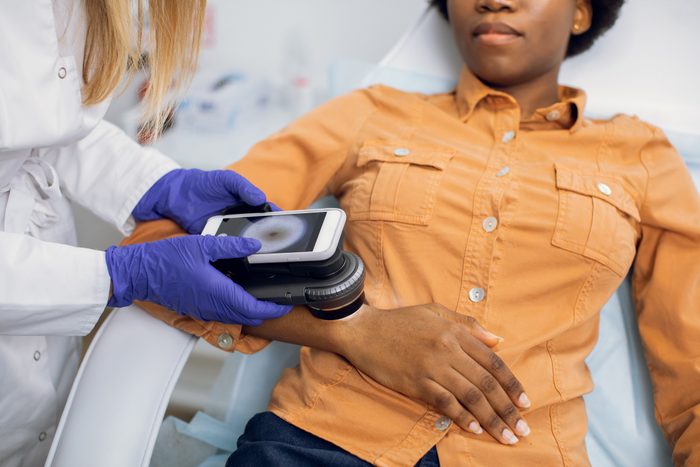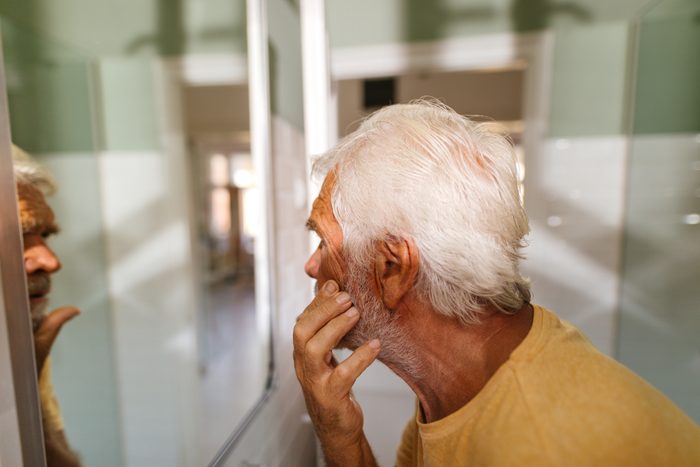
One of the most iconic annual weekends for R&R was met with the unanticipated news that Jimmy Buffett, the 76-year-old legendary singer-songwriter known for beachy folk rock that celebrates the enjoyment of life, lost his battle with Merkel cell carcinoma. “Merkel cell carcinoma is a rare and aggressive skin cancer which is often and sadly diagnosed late, when it has more metastatic features,” says Dr. Marianna Blyumin Karasik, MD, FAAD, a board-certified dermatologist and co-founder of Precision Skin Institute in Davie, FL (which happens to be located approximately one hour away from Jimmy Buffett’s Palm Beach home). “Metastatic” means the cancer originated in one site of the body and then spread further to other organs and tissues.
Dr. Karasik explains that Merkel cell carcinoma “usually appears in older, fair-skinned individuals in sun-exposed areas like the head and neck.” Although Buffett was diagnosed in 2019, he continued to perform through treatment, even in the months leading up to his passing—in fact, his last performance was at a Rhode Island restaurant in July. Buffett’s motivation to continue working during his battle with this type of skin cancer may have made it even more surprising for many fans to learn about the illness.
According to the American Cancer Society, each year Merkel cell carcinoma is diagnosed in roughly 2,000 people in the United States, making it a relatively rare skin cancer and one that can be missed. With that said, here are a few symptoms of Merkel cell carcinoma that aren’t commonly talked about, says Dr. Blyumin Karasik and a few other dermatologist experts.

Symptoms of Merkel cell carcinoma
1. A painless lump on the body
According to the Dana-Farber Cancer Institute in Boston, one of the tell-tale signs of Merkel cell carcinoma is a “single painless lump.” These bumps are often mistaken for a pimple, mosquito bite, stye, or sore, which can make be even harder to catch.
As Dr. Karasik explained, Merkel cell carcinoma lumps are generally most prominent in sun-exposed areas of the body including the head, face, and neck. However, skin cancer can develop even on sites of the body not exposed to sunlight.

2. The lump appears to grow rapidly
Many changes in the body occur over time, but with Merkel cell carcinoma, the lump usually grows faster within a few weeks or months.
As with most skin cancer, early detection of Merkel cell carcinoma is crucial, as the disease has a higher likelihood of being cured if caught early on. “If the cancer has spread, immunotherapy has become the new standard of care,” says Dr. Jason H. Miller, MD, board-certified dermatologist at Schweiger Dermatology Group. “These medications can utilize the immune system to target cancer cells, leading to improved survival in many cases with fewer side effects compared to traditional chemotherapy.”

3. The lump is pink, red, or purple in color
If you notice a bump on your body, you’ll want to take note of the color. “Merkel cell carcinoma usually presents itself as shiny blue or red bumps,” says Dr. Miller.

4. Consider your age
While skin cancer can occur at any age, Merkel cell carcinoma is more likely to be found in seniors. According to the American Academy of Dermatology Association, research has shown that 97% of people who develop Merkel cell carcinoma are older than 50 years old. Data suggest that people are in their seventies or eighties when they’re diagnosed with the disease.

5. Weak immune system
Most of us might not think about the immune system when it comes to skin cancer, but Dr. Miller says Merkel cell carcinoma tends to develop more in those with a weakened immune system. This can happen due to underlying conditions, certain medications, and age, so you’ll want to keep an eye on your immune health.
With that said, the Skin Cancer Foundation recommends individuals should undergo a professional skincare exam every year to check for abnormal growths and lesions, and more often if they are at higher risk (such as having greater sun exposure, old age, previous skin cancer, etc.)
Get The Healthy @Reader’s Digest newsletter and follow The Healthy on Facebook and Instagram. Keep reading:
